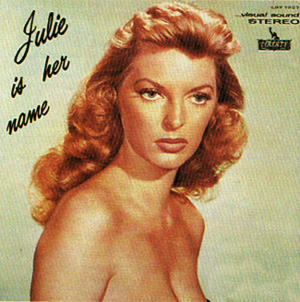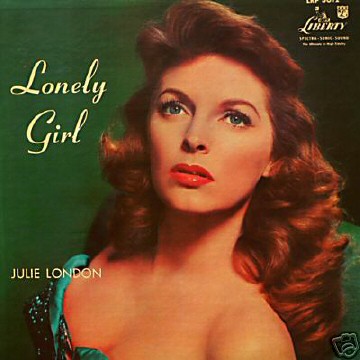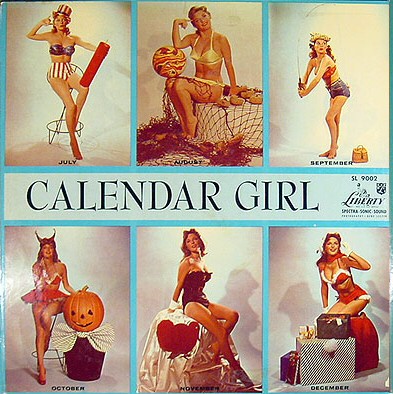 Julie Is Her Name
Julie Is Her Name
(Liberty:
LRP-3006/LST-7037)
Released: December 1955. Billboard peak: #2 (1/28/56).
Producer: Bobby Troup. With Barney Kessel on guitar and Ray Leatherwood on bass.
Notes: The Liberty Records site says that this album "almost singlehandedly started the 'torch singer' popularity in the late '50s." Originally issued in mono, the rechanneled stereo version of this album was issued 5/25/60.
CD Availability: 1992 EMI two-fer, with "Julie Is Her Name, Volume 2."
Liner notes by Bill Ballance:
Julie London might best be described as the girl with the "come hither" voice. In this, her first album, Julie's molten mezzo is handsomely set off by Barney Kessel's guitar and Ray Leatherwood's bass - a blending of three skills that adds up to an intimate, sleek, and sultry production. A performer who radiates charm and friendliness, Julie is a beautiful, piquant yet unassuming young woman who has flaxen hair, and eyes that are blue. These qualities are vocally evident in her furry singing style. Her choice of numbers is exactly right - ranging from I LOVE YOU to CRY ME A RIVER, the latter being a lush, lachrymose item written especially for Julie by her chilhood friend, Arthur Hamilton. CRY ME A RIVER, when heard by fellow members of the radio and music fraternity, created an instantaneous and enthusiastic reaction. As a result of this uniform response, LIBERTY released "CRY" as a single record, catapulting Julie to fame overnight. You've seen Julie in some fine motion pictures. Some of the more recent ones include "The Great Man," "Voice In The Mirror," "Saddle The Wind," "A Question Of Adultery," "Wonderful Country," "The Third Voice," and "Night Of The Quarter Moon." Let me put it this way - if Julie London doesn't remain at the singer's summit for years to come, then my name isn't - Bill Ballance
All Music Guide review by Scott Yanow:
For a time, Julie London was as famous for her sexy album covers as for her singing. Her debut is her best, a set of fairly basic interpretations of standards in which she is accompanied tastefully by guitarist Barney Kessel and bassist Ray Leatherwood. "Cry Me a River" from this album, was her biggest hit, and her breathy versions of such numbers as "I Should Care," "Say It Isn't So," "Easy Street," and "Gone With the Wind" are quite haunting. London's LPs have yet to be comprehensively reissued on CD, but can sometimes be found in specialty shops. They certainly stick in one's mind.
Our Reviews
If you'd like to share your own review of Julie Is Her Name here, please e-mail me.
Tracks
|
Cry Me a River |
Arthur Hamilton |
2:36 |
|
I Should Care |
Weston-Stordahl-Cahn |
2:35 |
|
I'm in the Mood for Love |
McHugh-Fields |
2:28 |
|
I'm Glad There Is You |
Madeira-Dorsey |
2:34 |
|
Can't Help Lovin' That Man |
Kern-Hammerstein |
3:08 |
|
I Love You |
Cole Porter |
1:58 |
|
Say It Isn't So |
Irving Berlin |
2:00 |
|
It Never Entered My Mind |
Rodgers-Hart |
2:25 |
|
Easy Street |
Jones-Carlton |
3:12 |
|
'S Wonderful |
George and Ira Gershwin |
1:33 |
|
No Moon At All |
Evans-Mann |
1:53 |
|
Laura |
Mercer-Raksin |
1:37 |
|
Gone With the Wind |
Wrubel-Magidson |
2:05 |
 Lonely
Girl
(Liberty: LRP-3012/LST-7029)
Lonely
Girl
(Liberty: LRP-3012/LST-7029)
Released: 1956. Billboard peak: #16.
Producer: Bobby Troup. With Al Viola on guitar.
Notes: Recorded in Hollywood in April 1955. Originally issued in mono, the rechanneled stereo version was issued in 1959.
CD Availability: 2002 EMI two-fer, with "Make Love to Me."
Liner notes (author unknown):
Julie London is one of those wonderful rarities of show business -- a genuine combination of beauty and talent. Too often about the most one can say of a strikingly beautiful woman is that she is strikingly beautiful. That's why it's so refreshing when someone like Julie comes along. There's so much more to talk about when you've run the gamut of her physical attractiveness. She's unquestionably an excellent actress. You've only to see her in the motion picture "The Red House," which she made when she was only eighteen, or the soon-to-be-released "The Great Man," to substantiate any proof of this.
But let's dwell more on her singing, because this is her newest venture. What is most intriguing about Julie's singing is her musicianly phrasing, her amazingly true intonation, and the simplicity and complete naturalness of her style. So many vocalists today have the annoying habit of becoming vastly different individuals when they begin to sing. Their enunciation becomes irritatingly pretentious; they begin inventing a new language -- "know" becomes "nayow" and "love" oddly sounds like "laulve." It becomes a cause for rejoicing when someone with taste comes along and sings honestly without the benefit of affectations and histrionics. Sincerity of approach has had much to do with Julie's rapid and widespread acceptance. People like her, because they believe her.
It's remarkable when you realize that Julie has such a paradoxical appeal. She seems to capture everyone from the housewife to the severest jazz critic; from the rock-and-roll-loving teen ager to the modern-sound-craving college student. And this is the girl who sang professionally for the first time only a scant seven months ago! It's undeniable that Julie's voice is not a big voice. And she may have vocal coaches throwing their hands in the air as she defies many of their precious fundamentals. But the end result is something no vocal coach could ever teach. Warmth and heart and sensitivity are not to be learned from teachers.
"Lonely Girl" is an especially apt title for Julie's newest album -- not only for the nostalgia of the lyric lines of the songs; not only for the subtle sadness of her singing style; but even more for Julie herself. There's an appealing loneliness in Julie. She has a way of getting out on a plane all by herself where no one can reach her. She is probably everything you would not expect of a girl in this business. She's quiet and shy and undemonstrative. There's none of the extrovert about her. Were she not so exceptionally pretty, she'd undoubtedly go unnoticed at a party; because she's never striving to impress anyone. All of this is reflected in her singing. She has a faculty of being able to detach herself completely and live the story she's telling. You seem to sense that she means every word that she's saying; and it's understandable, because she does.
You'll like this album. Julie has never sung better or more provocatively. As she gains confidence and assurance her voice gains stature; and yet she never loses that contagious wistful quality that has trademarked her. Why don't you just sit back and start the record from the beginning? Julie can be more convincing in four bars of music than anyone could possibly be in forty pages of words.
Al Viola is responsible for the imaginative guitar accompaniment you hear behind Julie's voice. Just as Barney Kessel and Ray Leatherwood were such an important part of her first album, "Julie Is Her Name"; Al is certainly an integral part of the exciting mood created in "Lonely Girl." This may be one of the first times a gut-stringed Spanish guitar has been used in this way, and I think it makes for a tremendously interesting blend of voice and background. Al came to California via Brooklyn ten years ago and has progressed rapidly from his Page Cavanaugh Trio days to one of the most sought-after guitarists in Hollywood. There's no need to say more of his musicianship. Just listen. Al can be convincing too.
All Music Guide review by Nick Dedina:
Liberty Records was pleasantly surprised when Julie London's debut album was such a big hit. Julie Is Her Name did contain the hit single "Cry Me a River," but each featured mellow jazz guitar and bass backing -- which was considered commercial suicide in 1955. So, instead of changing direction and recording the follow-up Lonely Girl with a full orchestra, Liberty wisely allowed London to strip the accompaniment down even more on the album by dropping the backing down to one instrument. Lone guitarist Al Viola plays gentle Spanish-tinged acoustic behind the hushed vocalist, and it suits London perfectly. While the singer was often chided for her beauty and lack of range, she deftly navigates these ballads without any rhythmic underpinnings to fall back on. London's intense focus on phrasing and lyrics recalls Chet Baker's equally telescopic approach. So while most of the album contains the usual midnight standards, London sings them in her own way. The title track is the one unfamiliar tune here, and it's a real gem, penned by Bobby Troup (he was London's producer, paramour, and future husband). The low-key Lonely Girl beat the sophomore slump and initially did almost as well in the charts as Julie Is Her Name. Instead of stripping away the guitar in order to make London's next release be the first a cappella torch album, Troup crafted Calendar Girl, a big-budget orchestral affair that was more in keeping with the thematic pop albums released at the time.
Our Reviews
If you'd like to share your own review of Lonely Girl here, please e-mail me.
Tracks
|
Lonely Girl |
Bobby Troup |
2:35 |
|
Fools Rush In |
Bloom - Mercer |
2:10 |
|
Moments Like This |
Loesser - Lane |
2:40 |
|
I Lost My Sugar in Salt Lake City |
Lange - Rene |
2:37 |
|
It's the Talk of the Town |
Livingston - Neiburg - Symes |
2:37 |
|
What'll I Do |
Irving Berlin |
1:59 |
|
When Your Lover Has Gone |
Einar Swan |
1:57 |
|
Don't Take Your Love From Me |
Henry Nemo |
2:46 |
|
Where or When |
Rodgers - Hart |
2:37 |
|
All Alone |
Irving Berlin |
1:51 |
|
Mean to Me |
Ahlert - Turk |
2:12 |
|
How Deep is the Ocean |
Irving Berlin |
2:12 |
|
Remember |
Irving Berlin |
1:47 |


Calendar Girl (Liberty: SL-9002)
Released: 1956. Billboard peak: #18.
Producer: Bobby Troup. Conductor/Arranger: Pete King.
Notes: Recorded in Hollywood in May 1956.
CD Availability: 1997 EMI two-fer, with "Your Number Please..."
Liner notes by screenwriter Richard Breen:
This essay on Julie London won't plead the apparent. It won't cite her good looks, nor argue that she is structurally sound. And it's unnecessary to comment on her voice. A lot of people have heard it and reported kindly. So, these notes will deal mainly with the album.
The selection of tunes is broad and demanding. It presumes that Julie will show greater versatility. She does. She takes on a variety of tunes; she treats them with skill.
There are thirteen numbers in the album...one for every month of the year. It's never divulged who goofed; but whether it was Tin Pan Alley or Augustus Caesar, we can all be grateful. About half of the tunes are standards. The others are new and unused.
Julie is ably aided by a group of top-flight professionals. Some pleasant male voices move in and out with the seasons. The band itself is split into three or four different combinations. They finish in pretty much a dead heat. The arrangements are by Pete King.
JANUARY: "June in January" This is a highgaited treatment of the Robin-Rainger standard. Except for Christmas bills, Julie manages to make everything that happens in January seem somewhat wonderful.
FEBRUARY: "February Brings the Rain" A new tune by Bobby Troup. It's a quiet blues number which proves that 28 days don't always make the shortest month. Julie does it with a suitable feeling of loneliness. She also makes it clear that she's sick and tired of the rain.
MARCH: "Melancholy March" is a composition by Herman Saunders and Dory Langdon. It was done especially for this album. A very shrewd commission indeed.
APRIL: "I'll Remember April" is one of the standards in the album. Properly executed, this song should carry the idea that lost love is actually a bonus for the early wear-and-tear. Julie neatly palms it off.
MAY: "People Who Are Born in May" This is a new tune by Earl Brent and is far-and-away the merriest exercise in the album. The lyric is especially optimistic if you happen to have been born in May. It's nicely accented with strings.
JUNE: "Memphis in June" A rural remembrance, done with grace and style. Julie makes your heart leap at the thought of Boss Crump and sweet oleanders.
JULY: "Sleigh Ride in July" It's sad to report that no month seems safe for a girl. The girl in this tune got hers right in the middle of July. But the weather was good.
AUGUST: "Time for August" A new number by Arthur Hamilton which sponsors the demure notion that a girl should have a new boy friend every month. At the end of the year, she's twelve times as happy. Mr. Hamilton does not say if an occasional repeat is permissible. Novel and tuneful enough to be a hit; Julie does not prejudice the cause.
SEPTEMBER: "September in the Rain" A Warren and Dublin standard. Julie does it on the up side and it's pleasing enough to make you go out and buy your own rain cloud.
OCTOBER: "This October" A bouncy entry which would have made Larry Hart proud; Bobby Troup wrote it. Julie sings it with suspicious conviction...enough to make us all happy she "caught him in the autumn."
NOVEMBER: "November Twilight" By the arranger and Paul Francis Webster. Julie doing this kind of number is really stuffing the ballot box.
DECEMBER: "Warm December" by Bob Russell. This tune explains how to take off the chill in mid-winter. As you might suspect, it's not done with a pot-bellied stove. Strings and trombone dominate.
13th MONTH: This extravagant hope is outlined in a second tune by Arthur Hamilton. You'll be glad to know that the man who wrote "Cry Me a River" has not run out of tears. In fact, he seems to have the western distributorship. The tune is done with a nice use of echo.
All Music Guide review by Nick Dedina:
Jazz critic Will Friedwald has stated that Julie London's records were so popular in the 1950s mainly because she looked so drop-dead gorgeous on the album covers. The marketing hook behind Calendar Girl may just be the main example for those critical of London's musical career, since its sleeve has made it a prized collector's item. The famous wraparound cover depicts cheesecake shots of London posed for every month of the year, while original issues of the album included a more-than-suggestive insert photo of the singer stretched out in bed. While Friedwald's correct about London's physical beauty, he's wrong in suggesting that the vocalist didn't have the talent to go along with her looks. Like Chet Baker, Julie London had an extremely limited vocal range but she did the most with what she had, possessing a special knack for torch songs that cast her in the role of a woman constantly being destroyed by love in general and by men in particular. The cover concept of Calendar Girl is carried over from the concept album, which features a narrative of romance lost and found for each month of the year before ending with one final tune called "The Thirteenth Month" (which is illustrated by that insert picture of London in bed). Since there aren't quality standards for every month of the year, one of Calendar Girl's pleasures can be found in the numbers written especially for the album, particularly those penned by Bobby Troup, London's husband. The jazz-oriented Troup hit pay dirt with such fine compositions as "Route 66," "Daddy," and "The Meaning of the Blues," but too few of his smart, witty songs have been widely recorded. Calendar Girl is a fun, if often bittersweet, ride and a must-have for fans of classic vocal pop and lounge music. Thankfully, EMI has reissued this album on CD in a two-fer package with the more traditional London session Your Number Please..., which, oddly enough, also features a very suggestive photo of London in bed.
Our Reviews
If you'd like to share your own review of Calendar Girl here, please e-mail me.
Tracks
|
June in January |
Robin - Rainger |
2:08 |
|
February Brings the Rain |
Bobby Troup |
2:22 |
|
Melancholy March |
Saunders - Langdon |
2:20 |
|
I'll Remember April |
Raye - de Paul - Johnston |
1:59 |
|
People Who Are Born in May |
Earl Brent |
1:41 |
|
Memphis in June |
Webster - Carmichael |
1:59 |
|
Sleigh Ride in July |
Burke - Van Heusen |
2:21 |
|
Time for August |
Arthur Hamilton |
2:00 |
|
September in the Rain |
Warren - Dublin |
1:41 |
|
This October |
Bobby Troup |
1:46 |
|
November Twilight |
King - Webster |
3:21 |
|
Warm December |
Bob Russell |
1:56 |
|
The Thirteenth Month |
Arthur Hamilton |
2:26 |
